#the penitential act
Text
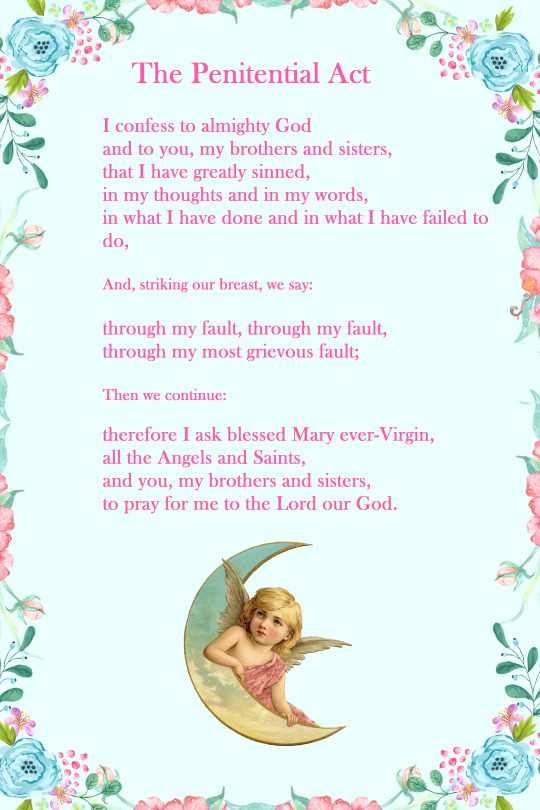
#the penitential act#christian#christianity#christentum#catholic#catholicism#angel#repentance#repent
18 notes
·
View notes
Text
i kind of want to give will catholic guilt/make him grow up catholic but poor people catholic
#psh what naw im not projecting my own lived experiences onto a grown ass man psh what nooo#i just think it would be really interesting to explore though bc then we can get into the good good catholic guilt#combined with hannibal's love of god but not necessarily any one kind of god/catholic god#another reason to will's list of why he Can Not do certain things/interact with ppl bc he is scared of sinning#or making them sin/being unclean#idk need more time to think about this than my gut reaction but i think exploring will's relationship with religion would be interesting#the fear mongering aspect of it too would add another flavor into his conversations with hannibal about god and god's will and what not#like just looking at the basic prayers said in a catholic mass is enough to send anyone into a spiral of self loathing and i am the worst e#ever like just READ the penitential act and tell me will wouldn't immediately condemn himself to hell forever#will graham
5 notes
·
View notes
Text
A) She's a 6, but one of her arms is a custom prosthetic made of gilded arm bones and has admitted to committing at least one murder.
B) She's an 8, but she's in love with a tub of ancient freezer meet.
C) She's a 10, but she's under a penitential vow of silence after making too many puns.
D) She's a 7, but she rejected your marriage proposal and now acts like she doesn't know you.
E) She's a 9, but she looks weirdly like one of your Barbie dolls and has trouble with appropriate displays of affection.
F) She's a 10, but her twin sister is creepy, and they might be sleeping together.
152 notes
·
View notes
Text
Goodness- I can't....
I've listened to Hellfire numerous times, and I still get chills on how beautiful Tony Jay sang.
His baritone voice made it seem that Frollo sang so passionately, singing his heart out of the temptation he's trying so hard to deny.
As if he's convincing Beata Maria (or really, himself) that this was not his fault... this is not his doing....
.
It started off like a prayer...
Adoration, yet it's filled with prideful remarks of his own regards, praising himself instead of God. Then transitioned to sound like accusations, Why does he sees her, why does he feel her?...
It went to Confessions.... only, he didn't acknowledge his wrong doings.... instead he claims it's not his fault, and even had the gall to blame Esmeralda...
Beautifully partnered with an ensemble singing Mea Culpa.... through my fault, through my fault... through my most grievious fault... The penitential act, he's supposed to confess his sins, and yet he didn't...
Then finally, Supplication, humbly begging for assistance... guidance... protection... yet even still he demanded for the source of his sins to burn...
The part,
"... or else let her be mine and mine alone...", absolutely chilling, gives me goosebumps everytime. Even in prayer he acts as if he has the power to let things go his way....
.....Was it even a prayer?
.
I'm convinced not even Disney's live action remakes can top Hellfire, no matter how many artists they hire to sing, no matter how famous, they cannot make another song sound so haunting and beautiful at the same time.
#Yes I just analysed this song as Frollo's failure#Hellfire is a mess of a prayer#I need you to listen to it again#This movie is utterly amazing#the hunchback of Notre Dame#Claude Frollo#Tony Jay#THoND#Judge Claude Frollo#Disney#text#rmf speaks#parts of a prayer#hellfire
202 notes
·
View notes
Text

So Close Yet So Far Away
Draco Malfoy x Fem!Reader
Warnings: Panic attacks, anxiety, self doubt, relationship doubt, negative thoughts, angst :(
Summary: Reader has a panic attack and Draco helps her.
Note: I’m so sorry I haven’t posted a story in a while, it was for some reason taking me forever to finish it even though I had it all planned out. Thanks for the patience. :) And no mention of Y/N if that’s okay! Have a wonderful day and enjoy! 😉
-Also I had to put this gif, he looks so sad! :(
___
She thought they were good. She thought he was good. She thought she was good…Wasn’t she?
That was the same set of questions or thoughts that ran through her mind each morning when his fingers no longer brushed her waist and at night when his cold back faced her.
Was it something she was doing? Something she said and it happened to give him the feeling of unsatisfactory?
She wished she could flick her wand and all could be fixed, but even magic like that couldn’t fix her mental problems. Some things couldn’t be fixed with magic, they had to be fixed with communication and understandings, heart to heart as they discussed their issues, hoping that later on they could at least hold onto their love for a little longer before it was gone.
It seemed these days she was the only one that held that hope, that on her part she was the one who wanted to discuss, not him. The real question was why and when. She just didn’t have the courage to bring it up, afraid to see the penitential snarl on his face or the disappointment towards her to rise in his chest.
She didn’t want that. She was sure no one wanted that. Heck, she bets he didn’t want that but it was something he couldn’t control. Something he had no other choice but to show.
Well, back to the present tense, she is back to the what seemed the cold sheets of lost hope and previous love and her eyes set on the ceiling; not planning on leaving the tiles any time soon.
She heard him breathing softly beside her, and when she was brave enough to glance she saw the slow rise of his shoulders as he slept; his back was still to her. She didn’t know if when she fell asleep somehow he knew and he secretly rolled over and embraced her, or he stayed in the same position the whole night, his body somehow afraid of grazing her skin in any way during his slumber.
It was most likely the second option, for she was sure that she would wake up from something so special beholding her (that something special being him.)
Simply his body facing her would wake her up. His touch upon her skin, for it always made her shiver in the best way. But of course she was imagining all that while she lay in bed with him next to her but far away, almost like he wanted nothing to do with her.
She couldn’t help it. The tears that arose in her eyes were against her will, but she knew the cause was her hurting heart inside her chest, beating the best it could through the pain. She couldn’t be more grateful for it, supplying blood for her body all whilst it stung with great pain.
Soon the tears that were just settled in her eyes were now taking home on her cheeks, flowing like mini rivers and her face was the deep green hills, the water swaying to and fro as the winds picked up.
Her brain started winding, sending thoughts that were so darkened and negative she could no longer breathe properly. Would he leave her? Sure the girl wasn’t as pretty as some other girls within the Magic world, specifically Hogwarts at the moment, but she was average; wasn’t that what she’s always been? Average?
Average isn’t good enough. Not for him. He deserved endless happiness compared to what he’s been through.
Was what she was giving him already, which was happiness and love, not enough for him? She thought so, but based on his current actions of ignoring her and acting like he’s reluctant to sleep beside her, was her displays of affection not satisfactory?
Were they satisfactory, yet not enough to fulfill his expectations?
Her brain was going so fast that it was then this she realized her heart was pounding, so much so the heard it in her ears.
She grew worried, since she wasn’t running or anything, for there was no reason her heart could be beating so quickly. Her lips parted, lungs suddenly starting to run out of air. Her breathing quickened, panicking even more when her heart didn’t stop and the ability to breathe was getting harder.
A wave of hot sweat ran over her like a chill, her legs breaking from the covers abruptly, chest clenching.
Her wobbly legs took her to the bathroom, hands almost slamming the door and fiddling with the lock until it clicked, hands still pressing pressure on it even though the knob already turned.
Her body ran out of strength and she let go quickly, leaning on the sink as she bent her head, squeezing her eyes shut so tightly she saw colors within her eyelids.
Her heavy breathing slowly changed to wheezing and tears, hiccups hurting her chest as her body fought for air for an unknown reason.
Her body flinched hardly when there was rough knocking on the door, the person wanting to come in.
“Loves, you okay?”
The voice. His voice.
It rumbled through the door, not just because he was in fact talking through a door, but also for the reason of his sleepy voice, still tired from his previous slumber.
She was silent besides her heavy breathing still being audible, but even that she was trying to keep quiet.
But of course she couldn’t do so, and since he got quiet as a response he knocked again and twisted the handle gently.
He knocked once again when he found out it was locked. “Loves, open.”
He said it so gently and soft, voice full of concern and love for her. She felt belonged, right then, felt loved and cared for. She walked over to the door hesitantly, hand reaching out and while doing so she saw it was shaking.
She fiddled with the handle with fear rising in her chest in anticipation.
Was he gonna leave her?
The door opened, messy blonde locks coming into view. Despite the softness of his voice earlier, her panic inside her chest caused her to doubt how he would react. She expected his eyes to be hard and full of irritation for I interrupting his sleep, but they were full of concern and worry within the orbs, silver surrounding her vision instead of tears.
He didn’t wait to have a staring contest with her before he closed the door, walking towards her and wrapping his splendor arms around her, stroking the ends of her hair and encouraging to to breath slower.
“I-I can’t.” She said. She spoke through breath after breath, no space between them.
She felt his head nod against her neck. “You can, loves.”
Tears kept streaming. Breathes kept coming out short. Hands kept stroking her cheeks to get rid of the coming tears once he lifted his head up from her neck area.
He sucked in a breath at seeing her in pain, fingers going to her hair and moving it away from her sweaty face.
He cupped her face in his hands, cradling it like the most delicate flower to ever exist. Because to him she was. And it was his job to water her and provide her light.
“Honey, just breathe! I’m here, aren’t I?”
She nodded in his hands, showing him how strong she was. And she’s been told she was by him; he tries to tell her every day.
He suddenly started breathing loud but steady, waving his hand gently to show her to copy him.
She did just that, and all doubts floated away, every questioning thought about their future fading away, replaced with nothing but sincere and genuine love.
Here then she embraced him once more, desperate to feel his warmth. Nose buried in his clothed chest, she mumbled, “Don’t ever leave me, please.”
He scoffed against her. “Leave you? Darling, my heart would rather die a thousand different ways than to leave you.”
-Sorry for any errors, I didn’t look it over! Thanks for reading and make sure to check out other stories:
👇
Masterlist
#draco lucius malfoy#draco malfoy#draco malfoy imagine#draco malfoy x reader#draco x reader#hogwarts school of witchcraft and wizardry#imagines#stories#tom felton x reader#x reader#today on tumblr#angst#panic attacks#draco malfoy angst#anxitey#overthinking#doubts#shadow of a doubt#Harry Potter#slytherin reader#Draco x you#draco x y/n#angst stories to torture yourself#crying#tears#attacks#panic#self doubt
49 notes
·
View notes
Text
privilege is something you're lucky to have, not something you should heroically deny yourself in an act of penitential self sacrifice to atone for your unworthiness in being granted safety where others aren't
43 notes
·
View notes
Text
There’s a scene in the movie about Fr. Stew where he walks into a church and they are beating their breasts saying “my fault, my fault, my most grievous fault” from the Penitential Act. But this movie is supposed to take place in the 1970s. That particular part of the Mass wasn’t added in English until 2010. It was like seeing a cellphone in a Godfather movie.
67 notes
·
View notes
Text

Saint Rosalia of Palermo
1130 - 1166
Feast day: September 4
Patronage: evolutionary studies, Palermo, plague
Born in Palermo, little is known of St. Rosalia. To be closer to God she lived her life in the seclusion of a cave and practiced many penitential acts. In 1624, many years after her death she appeared to a hunter and led him to her remains. Inscribed in the walls of the cave were the words, “I, Rosalia, daughter of Sinibald, Lord of Roses, and Quisquina, have taken the resolution to live in this cave for the love of my Lord, Jesus Christ.” At this time the island of Sicily was experiencing a terrible plague, and after parading her relics through the city, the plague miraculously ended.
Prints, plaques & holy cards available for purchase here: (website)
76 notes
·
View notes
Text
The 95 Thesis

by Martin Luther
1 When our Lord and Master Jesus Christ said, “Repent” (Matthew 4:17), he willed the entire life of believers to be one of repentance.
2 This word cannot be understood as referring to the sacrament of penance, that is, confession and satisfaction, as administered by the clergy.
3 Yet it does not mean solely inner repentance; such inner repentance is worthless unless it produces various outward mortification of the flesh.
4 The penalty of sin remains as long as the hatred of self (that is, true inner repentance), namely till our entrance into the kingdom of heaven.
5 The pope neither desires nor is able to remit any penalties except those imposed by his own authority or that of the canons.
6 The pope cannot remit any guilt, except by declaring and showing that it has been remitted by God; or, to be sure, by remitting guilt in cases reserved to his judgment. If his right to grant remission in these cases were disregarded, the guilt would certainly remain unforgiven.
7 God remits guilt to no one unless at the same time he humbles him in all things and makes him submissive to the vicar, the priest.
8 The penitential canons are imposed only on the living, and, according to the canons themselves, nothing should be imposed on the dying.
9 Therefore the Holy Spirit through the pope is kind to us insofar as the pope in his decrees always makes exception of the article of death and of necessity.
10 Those priests act ignorantly and wickedly who, in the case of the dying, reserve canonical penalties for purgatory.
11 Those tares of changing the canonical penalty to the penalty of purgatory were evidently sown while the bishops slept (Matthew 13:25).
12 In former times canonical penalties were imposed, not after, but before absolution, as tests of true contrition.
13 The dying are freed by death from all penalties, are already dead as far as the canon laws are concerned, and have a right to be released from them.
14 Imperfect piety or love on the part of the dying person necessarily brings with it great fear; and the smaller the love, the greater the fear.
15 This fear or horror is sufficient in itself, to say nothing of other things, to constitute the penalty of purgatory, since it is very near to the horror of despair.
16 Hell, purgatory, and heaven seem to differ the same as despair, fear, and assurance of salvation.
17 It seems as though for the souls in purgatory fear should necessarily decrease and love increase.
18 Furthermore, it does not seem proved, either by reason or by Scripture, that souls in purgatory are outside the state of merit, that is, unable to grow in love.
19 Nor does it seem proved that souls in purgatory, at least not all of them, are certain and assured of their own salvation, even if we ourselves may be entirely certain of it.
20 Therefore the pope, when he uses the words “plenary remission of all penalties,” does not actually mean “all penalties,” but only those imposed by himself.
21 Thus those indulgence preachers are in error who say that a man is absolved from every penalty and saved by papal indulgences.
22 As a matter of fact, the pope remits to souls in purgatory no penalty which, according to canon law, they should have paid in this life.
23 If remission of all penalties whatsoever could be granted to anyone at all, certainly it would be granted only to the most perfect, that is, to very few.
24 For this reason most people are necessarily deceived by that indiscriminate and high-sounding promise of release from penalty.
25 That power which the pope has in general over purgatory corresponds to the power which any bishop or curate has in a particular way in his own diocese and parish.
26 The pope does very well when he grants remission to souls in purgatory, not by the power of the keys, which he does not have, but by way of intercession for them.
27 They preach only human doctrines who say that as soon as the money clinks into the money chest, the soul flies out of purgatory.
28 It is certain that when money clinks in the money chest, greed and avarice can be increased; but when the church intercedes, the result is in the hands of God alone.
29 Who knows whether all souls in purgatory wish to be redeemed, since we have exceptions in St. Severinus and St. Paschal, as related in a legend.
30 No one is sure of the integrity of his own contrition, much less of having received plenary remission.
31 The man who actually buys indulgences is as rare as he who is really penitent; indeed, he is exceedingly rare.
32 Those who believe that they can be certain of their salvation because they have indulgence letters will be eternally damned, together with their teachers.
33 Men must especially be on guard against those who say that the pope’s pardons are that inestimable gift of God by which man is reconciled to him.
34 For the graces of indulgences are concerned only with the penalties of sacramental satisfaction established by man.
35 They who teach that contrition is not necessary on the part of those who intend to buy souls out of purgatory or to buy confessional privileges preach unchristian doctrine.
36 Any truly repentant Christian has a right to full remission of penalty and guilt, even without indulgence letters.
37 Any true Christian, whether living or dead, participates in all the blessings of Christ and the church; and this is granted him by God, even without indulgence letters.
38 Nevertheless, papal remission and blessing are by no means to be disregarded, for they are, as I have said (Thesis 6), the proclamation of the divine remission.
39 It is very difficult, even for the most learned theologians, at one and the same time to commend to the people the bounty of indulgences and the need of true contrition.
40 A Christian who is truly contrite seeks and loves to pay penalties for his sins; the bounty of indulgences, however, relaxes penalties and causes men to hate them — at least it furnishes occasion for hating them.
41 Papal indulgences must be preached with caution, lest people erroneously think that they are preferable to other good works of love.
42 Christians are to be taught that the pope does not intend that the buying of indulgences should in any way be compared with works of mercy.
43 Christians are to be taught that he who gives to the poor or lends to the needy does a better deed than he who buys indulgences.
44 Because love grows by works of love, man thereby becomes better. Man does not, however, become better by means of indulgences but is merely freed from penalties.
45 Christians are to be taught that he who sees a needy man and passes him by, yet gives his money for indulgences, does not buy papal indulgences but God’s wrath.
46 Christians are to be taught that, unless they have more than they need, they must reserve enough for their family needs and by no means squander it on indulgences.
47 Christians are to be taught that they buying of indulgences is a matter of free choice, not commanded.
48 Christians are to be taught that the pope, in granting indulgences, needs and thus desires their devout prayer more than their money.
49 Christians are to be taught that papal indulgences are useful only if they do not put their trust in them, but very harmful if they lose their fear of God because of them.
50 Christians are to be taught that if the pope knew the exactions of the indulgence preachers, he would rather that the basilica of St. Peter were burned to ashes than built up with the skin, flesh, and bones of his sheep.
51 Christians are to be taught that the pope would and should wish to give of his own money, even though he had to sell the basilica of St. Peter, to many of those from whom certain hawkers of indulgences cajole money.
52 It is vain to trust in salvation by indulgence letters, even though the indulgence commissary, or even the pope, were to offer his soul as security.
53 They are the enemies of Christ and the pope who forbid altogether the preaching of the Word of God in some churches in order that indulgences may be preached in others.
54 Injury is done to the Word of God when, in the same sermon, an equal or larger amount of time is devoted to indulgences than to the Word.
55 It is certainly the pope’s sentiment that if indulgences, which are a very insignificant thing, are celebrated with one bell, one procession, and one ceremony, then the gospel, which is the very greatest thing, should be preached with a hundred bells, a hundred processions, a hundred ceremonies.
56 The true treasures of the church, out of which the pope distributes indulgences, are not sufficiently discussed or known among the people of Christ.
57 That indulgences are not temporal treasures is certainly clear, for many indulgence sellers do not distribute them freely but only gather them.
58 Nor are they the merits of Christ and the saints, for, even without the pope, the latter always work grace for the inner man, and the cross, death, and hell for the outer man.
59 St. Lawrence said that the poor of the church were the treasures of the church, but he spoke according to the usage of the word in his own time.
60 Without want of consideration we say that the keys of the church, given by the merits of Christ, are that treasure.
61 For it is clear that the pope’s power is of itself sufficient for the remission of penalties and cases reserved by himself.
62 The true treasure of the church is the most holy gospel of the glory and grace of God.
63 But this treasure is naturally most odious, for it makes the first to be last (Mt. 20:16).
64 On the other hand, the treasure of indulgences is naturally most acceptable, for it makes the last to be first.
65 Therefore the treasures of the gospel are nets with which one formerly fished for men of wealth.
66 The treasures of indulgences are nets with which one now fishes for the wealth of men.
67 The indulgences which the demagogues acclaim as the greatest graces are actually understood to be such only insofar as they promote gain.
68 They are nevertheless in truth the most insignificant graces when compared with the grace of God and the piety of the cross.
69 Bishops and curates are bound to admit the commissaries of papal indulgences with all reverence.
70 But they are much more bound to strain their eyes and ears lest these men preach their own dreams instead of what the pope has commissioned.
71 Let him who speaks against the truth concerning papal indulgences be anathema and accursed.
72 But let him who guards against the lust and license of the indulgence preachers be blessed.
73 Just as the pope justly thunders against those who by any means whatever contrive harm to the sale of indulgences.
74 Much more does he intend to thunder against those who use indulgences as a pretext to contrive harm to holy love and truth.
75 To consider papal indulgences so great that they could absolve a man even if he had done the impossible and had violated the mother of God is madness.
76 We say on the contrary that papal indulgences cannot remove the very least of venial sins as far as guilt is concerned.
77 To say that even St. Peter if he were now pope, could not grant greater graces is blasphemy against St. Peter and the pope.
78 We say on the contrary that even the present pope, or any pope whatsoever, has greater graces at his disposal, that is, the gospel, spiritual powers, gifts of healing, etc., as it is written, [1 Corinthians 12:28].
79 To say that the cross emblazoned with the papal coat of arms, and set up by the indulgence preachers is equal in worth to the cross of Christ is blasphemy.
80 The bishops, curates, and theologians who permit such talk to be spread among the people will have to answer for this.
81 This unbridled preaching of indulgences makes it difficult even for learned men to rescue the reverence which is due the pope from slander or from the shrewd questions of the laity.
82 Such as: “Why does not the pope empty purgatory for the sake of holy love and the dire need of the souls that are there if he redeems an infinite number of souls for the sake of miserable money with which to build a church? The former reason would be most just; the latter is most trivial.
83 Again, “Why are funeral and anniversary masses for the dead continued and why does he not return or permit the withdrawal of the endowments founded for them, since it is wrong to pray for the redeemed?”
84 Again, “What is this new piety of God and the pope that for a consideration of money they permit a man who is impious and their enemy to buy out of purgatory the pious soul of a friend of God and do not rather, because of the need of that pious and beloved soul, free it for pure love’s sake?”
85 Again, “Why are the penitential canons, long since abrogated and dead in actual fact and through disuse, now satisfied by the granting of indulgences as though they were still alive and in force?”
86 Again, “Why does not the pope, whose wealth is today greater than the wealth of the richest Crassus, build this one basilica of St. Peter with his own money rather than with the money of poor believers?”
87 Again, “What does the pope remit or grant to those who by perfect contrition already have a right to full remission and blessings?”
88 Again, “What greater blessing could come to the church than if the pope were to bestow these remissions and blessings on every believer a hundred times a day, as he now does but once?”
89 “Since the pope seeks the salvation of souls rather than money by his indulgences, why does he suspend the indulgences and pardons previously granted when they have equal efficacy?”
90 To repress these very sharp arguments of the laity by force alone, and not to resolve them by giving reasons, is to expose the church and the pope to the ridicule of their enemies and to make Christians unhappy.
91 If, therefore, indulgences were preached according to the spirit and intention of the pope, all these doubts would be readily resolved. Indeed, they would not exist.
92 Away, then, with all those prophets who say to the people of Christ, “Peace, peace,” and there is no peace! (Jer 6:14)
93 Blessed be all those prophets who say to the people of Christ, “Cross, cross,” and there is no cross!
94 Christians should be exhorted to be diligent in following Christ, their Head, through penalties, death and hell.
95 And thus be confident of entering into heaven through many tribulations rather than through the false security of peace (Acts 14:22).
26 notes
·
View notes
Text
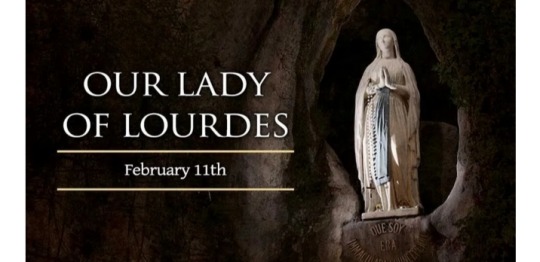
On February 11, the Catholic Church celebrates the liturgical memorial of Our Lady of Lourdes, recalling a series of 18 appearances that the Blessed Virgin Mary made to a 14-year-old French peasant girl, Saint Bernadette Soubirous.
The Marian apparitions began on 11 February 1858, ended on July 16 that year, and received the local bishop's approval after a four-year inquiry.
Coming soon after the 1854 dogmatic definition of her Immaculate Conception, the Virgin Mary's appearances at Lourdes turned the town into a popular travel destination.
Thousands of people say their medical conditions have been cured through pilgrimage, prayer and the water flowing from a spring to which Bernadette was directed by the Blessed Virgin.
Experts have verified 69 cases of miraculous healing at Lourdes since 1862.
St. Bernadette also has her own liturgical memorial, which occurs February 18 in France and Canada, and April 16 elsewhere.
Born on 7 January 1844, the future visionary was the first child of her parents Francois and Louise, who both worked in a mill run by Francois.
Their family life was loving but difficult. Many of Bernadette's siblings died in childhood, and she developed asthma.
Economic hardship and an injury suffered by her father cost them the mill in 1854.
Years of poverty followed, during which Bernadette often had to live apart from her parents and work rather than attending school.
In January 1858, she returned to her family, whose members were living in a cramped single room.
Strongly committed to her faith, Bernadette made an effort to learn the Church's teachings despite her lack of formal education.
On 11 February 1858, Bernadette went to gather firewood with her sister and a friend.
As she approached a grotto near a river, she saw a light coming from a spot near a rosebush.
The light surrounded a woman who wore a white dress and held a rosary.
Seeing the lady in white make the sign of the Cross, Bernadette knelt, took out her own rosary, and began to pray.
When she finished praying, the woman motioned for her to approach. But she remained still, and the vision disappeared. Her companions had seen nothing.
Bernadette described the lady in white to them, demanding they tell no one. But the secret came out later that day.
The next Sunday, Bernadette returned to the grotto, where she saw the woman again.
The identity of the apparition, however, would remain unknown for several weeks.
Some adults accompanied Bernadette on her third trip on February 18, though they did not see the vision she received.
The woman in white asked the girl to return for two weeks.
“She told me also,” Bernadette later wrote, “that she did not promise to make me happy in this world, but in the next.”
A group of family members and others went with her to the cave the next day, but only the young peasant girl saw the woman and heard her words.
Over the next few days, the number of people in attendance at the cave swelled to more than 100.
A parish priest, Father Peyramale, became concerned – as did the police.
On February 24, 250 people saw Bernadette break into tears, but only she heard the woman’s message:
“Penance! Penance! Penance! Pray to God for sinners. Go, kiss the ground for the conversion of sinners.”
A larger crowd was there on February 25 – but they were shocked to see Bernadette drinking from a muddy stream and eating weeds.
The apparition had told her to drink the water, and the weed-eating was a penitential act.
Onlookers, meanwhile, saw only the girl’s unusual behavior, and popular fascination turned to ridicule and suspicion.
On February 27, Bernadette made a joyful discovery: the spring from which she drank was not muddy now but clear.
As the crowds continued to gather, this change was noticed, and a woman with a paralyzed arm came to the water hoping to be healed.
Four years later, her case would be recognized as the first miraculous healing at Lourdes.
Public interest continued, and Bernadette heard a recurring message from the vision:
“Go, tell the priests to bring people here in procession and have a chapel built here.”
While others were quick to conclude that Bernadette was seeing the Virgin Mary, the visionary herself did not claim to know the woman’s identity.
As she conveyed the repeated message to Fr. Peyramale, the priest grew frustrated and told Bernadette to ask the woman her name.
But when she did so, the woman smiled and remained silent. Her identity remained a mystery after the initial two-week period.
Three weeks later, on the Feast of the Annunciation, Bernadette visited the cave again.
When she saw the lady, she kept asking to know her identity. Finally, the woman folded her hands, looked up and said:
“I am the Immaculate Conception.”
The seer, devout but uneducated, did not know what these words meant.
She related them to Fr. Peyramale, who was stunned and informed his bishop.
Bernadette saw the Blessed Virgin Mary two more times in 1858: on the Wednesday after Easter, and on the feast of Our Lady of Mount Carmel.
In 1862, the local bishop declared the apparitions worthy of belief.
St. Bernadette left Lourdes in 1866 to join a religious order in central France, where she died after several years of illness on 16 April 1879.
By the time of her death, a basilica had been built and consecrated at the apparition site, under the leadership of Fr. Peyramale.
8 notes
·
View notes
Text
If we study the literature of the ancient Babylonians and Sumerians, we can no longer believe the description of "pagan" religion that has long been part of Western tradition and is still often found in modern religious writing. Instead of capricious gods acting only in pursuit of their own desires, we meet deities concerned with the proper ordering of the universe and the regulation of history. Instead of divine cruelty and arrogance, we find deliberation and understanding. Instead of lawlessness and violence, we see a developed legal system and a long tradition of reflective jurisprudence. Instead of immoral attitudes and behavior, we find moral deliberation, philosophical speculation, and penitential prayer. Instead of wild orgiastic rites, we read of hymns, processions, sacrifices, and prayers. Instead of the benighted paganism of the Western imagination, cuneiform literature reveals to us an ethical polytheism that commands serious attention and respect.
But this new valuation of paganism creates its own dilemmas and awakens new questions. If the Bible is not the first dawn of enlightenment in a world of total darkness, then what is it? If polytheism was not the dark disaster that our cultural tradition has imagined it to be, why was it abandoned in Israel and replaced by biblical monotheism? If the old religions swept away by our own monotheist tradition were not grossly deficient, how can we find the precise significance of one God as opposed to the many? How does a monotheistic religion develop? Did the god of Israel simply absorb all the functions and attributes of the pagan gods, essentially changing nothing? Or did monotheism represent a radical break with the past after all, a break not as simply defined and immediately apparent as has been believed, but no less revolutionary?
The discovery of advanced polytheism poses a central theological issue: if polytheism can have such positive attributes, what is the purpose of monotheism? Did the Bible simply substitute another system, one that represented no advance towards a better understanding of the universe and a more equitable way of living? Indeed, were there some aspects of paganism lost in the transition that present, in fact, a more positive way of living in the world? The immediacy of these issues makes imperative an analysis of the nature of paganism and the precise nuances and essential messages of the monotheist revolution of the Bible. We cannot build our spiritual quest on prejudiced assumptions and polemical attributions. We must attain a profound knowledge of ancient polytheism and a sophisticated reading of the biblical texts informed by this knowledge. Thanks to the discovery of ancient Near Eastern literature, we have the ability to study these questions, understand our own past religious development, and make informed contributions to our future.
-Tikva Frymer-Kensky, In the Wake of the Goddesses: Women, Culture, and the Biblical Transformation of Pagan Myth
17 notes
·
View notes
Text



THE GIFT OF FLOWERS
Rich sparkling blooms so pretty to show
Much more beauty, beyond their glow
Graceful as soft tender wind blows
Calmly as the peaceful river flows
A penitential act to set me free
Sweet bouquet saying I’m sorry
A true friend is indeed hard to find
Flowers for you, because you’re kind
Blossoms, I am grateful, dear beautiful
Most of all, you’re special and wonderful
©Johnny J P Lee
25 January 2023
Gogyoshiren Poem (10)
Photos Credit J. P. Lee
#poetryportal#writerscreeds#smittenbypoetry#writtenconsiderstions#acrobat888#the subservient human#writingthestorm#writeundertheinfluence#poetscommunity#inkstainsandheartbeats#inkstay#bitsofstarglow#poeticstories#spilledwords#spilledthoughts
27 notes
·
View notes
Text
sacrificial son
I confess to almighty God and to you, my brothers and sisters,
that I have greatly sinned,
in my thoughts and in my words,
in what I have failed to do,
through my fault, through my fault,
through my most grievous fault.
-Penitential Act
When his daddy leaves him with the Benoits for four days, Will hears the Penitential Act for the first time.
It is during Sunday mass at noon, sharp, at Our Lady of Mercy Catholic Church, an hour away from the Benoit’s home. Mrs.Benoit had done something with his hair, oiled and greased it up into a crumpled slick back that his curls barely tolerated. It itched along his scalp, but he didn’t dare touch it. Beside him, the Benoit’s young son, Richard, sits with a similar hair arrangement, though much more suited for his thin, dark blond hair.
The air in the church is stuffy and warm, and there’s more rain to come after the morning shower, but it’s only been half an hour and there’s yet another to go. Mr.Benoit is reading up on the altar, his slow, mumbling scripture a lulling thing that makes Will want to fall asleep. Though kind enough to take the poor son of Louis Graham whenever a job came calling, they were strict and unwilling to compromise on the subject of saving lost souls and keeping theirs from the deepest pits of Hell.
Will reminds himself of that as he feels his eyes slipping, shying from the sharp pinch Mrs.Benoit gives him when she notices his slumped posture. Around him, he can feel the similar strictness kept by the righteous parents of sleepy, bored children, a split line of rapturous attention and drooling ignorance. Those most devoted are sat closest to the front, where Will, the Benoits, and a mix of elderly widows and ever-grievers sit with heads bowed low and eyes following through every passage.
When Father John stands, everyone else does too. When Father John sits, everyone kneels. It is a kind of submission that makes Will want to get to his knees in earnest compliance. Beyond the bored, misunderstanding attention of the various children in attendance, there are the true believers that raise their hands to the church ceiling and speak to the Lord with holy tongues and confessions. It is a kind of honest begging that confuses Will in his own stance of to-believe-or-not-to-believe.
His daddy doesn’t believe in God. Louis Graham says God doesn’t give enough of a damn to exist, and even if He did, God wouldn’t want to involve Himself in their mess. God was too busy.
Mr.Benoit says God is always watching and knows everything you do and say, and that when the day of Judgement comes, He will know exactly where to send you. The Non-Believers will be sent to Hell, and the Believers will be seated at the right hand of the Father in perfection for all eternity.
To Will, 11 years old and only just beginning middle school, the choice to believe-or-not seems obvious. If all you have to do is say you believe in God to get to Heaven, then it was no small task. William Graham believes in God like he believes his daddy will come back for him after his latest job finishes. Louis Graham will come to the Benoits with thanks but no money to pay them for their time and trouble, and they’ll celebrate with self-caught catfish and some red beans and rice for dinner.
It was easy to believe in God, in this way. Surrounded by faithful believers with their heads bowed, kneeled before Jesus Christ, bloodied and awesome and looming over the congregation. It was easy to believe in God and his sacrificial Son. It was easy to bow his head and fold his hands, mimicking the True Believers in body and word.
“Dear God,” he mouths, shutting his eyes tightly so he doesn’t have to watch the way Mrs.Benoit says affair, “I’m sorry I sinned. I believe in you. Even though my daddy doesn’t, I’ll believe in you enough for the both of us. Sorry again, God. Amen.”
He stays kneeling for an extra minute, knowing that getting up too soon is a sin to those that notice, and when he sits back in his chair, Richard is already seated and picking at his nose. Will looks away when the boy wipes his finger on the pages of his Bible, and waits for everyone else to finish.
When it finally comes time for everyone to get in line, a long, anxious procession for the Body and Blood of Jesus Christ, Mrs.Benoit gently holds Will’s shoulders and tells him to cross his arms. The grandmotherly figure that holds out the bowl of what looks like, to Will, wafers, smiles at him and waves her hand over his body in the sign of the Cross.
“Peace be with you.”
“Amen,” says Will.
“The Body of Christ.”
“Amen,” says Mrs.Benoit.
Will watches as Mrs.Benoit sticks out her tongue, patient as the old grandmother carefully places a wafer on it. Mrs.Benoit is secretly displeased. She doesn’t like receiving it this way. She doesn’t like having to chaperone Will, an outsider, during her holy hour. She wishes Mr.Benoit didn’t constantly leave her alone with Richard. She wishes she could really, truly worship like she wants to. She wishes God would save her.
They shuffle back to their pew, where they kneel in prayer and submission again, and Will thinks about the Penitential Act. His fault, his fault, what he has failed to do.
To Will, true worship seems like one endless apology for existing. Or, at least, failing to exist in the right way.
“Dear God,” he mouths again, resting his head on the pew in front of him, “Please let Mrs.Benoit know I’m sorry. She would be happier alone, so please help her be alone. She loves you. Also, please tell my daddy to come get me soon. I am sorry for sinning. Sorry, God. Amen.”
When they leave mass, Mr.Benoit turns on the radio and Gospel music sings like static in their cramped car. Mrs.Benoit’s arms and legs are crossed and Richard is still picking his nose. The clouds above them are dense and heavy with foretold rain, and Will lays his head against the passenger window.
Will’s belief in God strengthens when he sees his daddy’s old truck sitting in the Benoit’s front yard, a skinny man smoking a cigarette in a way Will has only ever known Louis Graham to do leaning against it. As soon as the car is parked, Will launches himself out and directly into his daddy’s hard arms, big hand digging into his hair and mussing up the tacky grease.
“Thanks ‘fer takin’ my boy,” says Louis, stubbing out his cigarette beneath his shoe. “‘M very grateful for it.”
Mr.Benoit reaches out a hand to shake. “He was a joy to have. You can leave him with us anytime.”
Will looks at Mrs.Benoit and watches the way her demure pink lipstick seems to ripple on her lips like a living thing. Richard clutches at his mother’s dress, hiding from the man that smells like rotted fish and tobacco. He is afraid. Will waves once at the boy and climbs into his daddy’s truck.
The Benoit family stands in their driveway to wave off the Grahams, Richard still tucked away in his mother’s arms, and Will watches their figures drift into the background in the rearview mirror. He can already smell the downpour on its way, and when he turns to his daddy, there’s another cigarette in his mouth.
“The fishin’ was good?” asks Will, seatbelt digging into the flesh under his chin. He’s too small to be in the front seat but his daddy lets him anyway.
“Redfish, catfish, snappas’, bass,” his daddy lists off, mouth crooked in the best smile he can manage with his stained teeth and busted lips from too many fights. “We gonna eat good tonight, boy.”
God is good, Will thinks as he fiddles happily in his seat. He answered my prayers.
They eat catfish and red beans and rice for dinner that night, and his daddy even lets him try a sip of his beer. Will doesn’t even mind when his daddy laughs in his face after he spits it out.
He goes to bed full and warm and happy to be home, and the next morning during breakfast, Louis Graham sighs and says, with little ceremony, something bad happened last night.
“‘M sorry, boy,” says his daddy, skin tight around the eyes. “The Benoits… the boy and his daddy. They died last night in a… in a car accident. The roads, y’know, they just get so damn slick after a rain. ‘M sorry, boy. Sorry ‘bout your friend.”
Will doesn’t say anything immediately. All he can think about is what Mr.Benoit said about God. What God said about Himself. How he killed His one and only Son for the good of the world. Will wonders if Mrs.Benoit is happier now. He doesn’t think so.
“I’m sorry,” whispers Will, his daddy stilling like a storm. “It’s all my fault. I didn’t mean for God to listen so good.”
“What ‘chu mean, boy? What’re you on about?”
“I’m sorry, daddy, I really am. She was so sad and she was tired and I thought God would help her. I thought I could help her.”
“No, none of dat nonsense, ya’ hear me? Hush up and eat your food.”
“It’s my fault. It’s all my fault, daddy. I prayed that Mrs.Benoit would be alone and God heard me and killed them. I didn’t mean it, I didn’t mean nothing by it, I was just trying to help–”
Louis slams a fist against their rickety table and Will’s fork falls to the ground like thunder.
“I said enough! Tweren’t nobody’s fault but the roads. God didn’t listen to no little boy like you and kill ‘em, ya’ hear? It’s a damn shame what happen’, but it ain’t no one’s fault. ‘Specially not yours.” His daddy sighs and leans over to scoop more red beans onto his poor son’s plate. “Now eat. Tears never helped nobody ‘cept the Devil. You ain’t doin’ no one any good like dat, so stop your crying. You can feel sad later. Now eat, boy.”
Too busy trying to stop crying, Will doesn’t move to pick up his fork. He watches as his daddy bends his bony back to pick it up, and Will counts four ridges through his thin shirt before Louis straightens and places the utensil gently by his son’s plate. His daddy goes quiet, timidly chewing on his leftover rice, ever and always regretful of a temper written marrow-deep, and Will wishes he knew how to be a good son. One good enough for God to listen to and hear right. Maybe even one good enough for him to have been named Issac instead of William.
Louis Graham deserved that at least after God took his Mary.
They are not invited to the funeral. From a street corner, they watch the funeral procession drive by and Will sees Ms.Benoit sitting in the passenger seat of the hearse. Will had been told before that only the dead rode in that car. He grips his daddy’s hand hard as he accepts that truth. When his daddy asks him if he wants to visit his friend’s grave, Will shakes his head and stops himself from saying it would only scare the boy.
After that, Louis Graham is careful to choose neighbors that don’t go to church. This becomes an impossible task and after two weeks of trying to beg a job for a few more days of wiggle room, Louis Graham sits his son down and shows him how to hold a gun.
“You don’t touch it unless you’re in danger,” says his daddy, a cold light in his eyes as he looks at the portrait of his one and only son holding a thing that could kill him as much as save him. “An’ you don’t open dat door for no one. Not the neighbors, not the police, not God– no one. Ya’ hear?”
“Yes, sir.”
“What’d I say?”
“Don’t touch the gun and don’t open the door.”
Louis Graham stares at his son hard for a moment, sucking in his hollow cheeks, before squeezing his small son’s shoulders. He looks too much like his mother, and Louis Graham is familiar with how jealous God can be. He hopes his blood has been enough to dilute the goodness within his son. He hopes it’s enough to keep him here. He hopes his son will stay.
“You know how ta’ work the stove. There’s lots of food in the fridge ‘n pantry. Go to bed at 8 o’clock sharp, ya’ hear?”
“Yes, sir.”
His daddy nods to himself once, then twice, before clearing his throat and standing. “I’ll be back on Wednesday.” That is three days from now. His daddy wants to say more but can’t. Will understands anyway. “Be good.”
“Yes, sir.”
When his daddy leaves, Will hides the gun in a kitchen drawer and tries not to think about it. He turns on the TV and flips through channels and doesn’t think about the knife his daddy showed him how to use when he was 9, resting in a drawer next to the gun. It’s a gutting knife. For fish. Will tries not to think about using it for anything else.
On one of the channels, a priest is reading. His robes are red and Will thinks they look like the color of his daddy’s working shirt. His daddy’s shirts start out white.
The priest’s voice wavers through the TV, and his grave eyes seem to sink into the pixels. “Those who live according to the flesh have their minds set on what the flesh desires; but those who live in accordance with the Spirit have their minds set on what the Spirit desires.”
A car backfires outside and Will jumps in his seat. For the last couple of weeks, he’s dreamt about Richard. He can’t remember the details of his face, but Richard is always crying and his skull is shaped the wrong way. Mr.Benoit is there, too, on his knees and praying. Loudly.
“The mind governed by the flesh is death, but the mind governed by the Spirit is life and peace. The mind governed by the flesh is hostile to God; it does not submit to God’s law, nor can it do so.” The TV priest pauses for a moment, grainy red robes fluttering around his hands as he scrutinizes a congregation beyond Will’s sight. “Those who are in the realm of the flesh cannot please God. Amen.”
Will turns off the TV before the imaginary people can answer. He feels queasy. Something inside of him itches and wants to go to the kitchen. He remains where he is. Later, like always, it will rain and his daddy will probably be out on his boat catching fresh fish for the local diners. Will wishes he could go with him, but his daddy says he’s not big enough to haul in the type of fish he catches. Says that a gator would eat him up quick, a tasty snack for its hungry teeth.
The day passes into the night, and like the good son he wants to be, Will goes to bed at 8 o’clock, and in the morning when he wakes, he heats up more leftovers on the stove like his daddy taught him, and spends another day like the one before. There is no priest on TV this time, but there is Tom & Jerry, and Will fills his head with funny cats and conniving mice and does his best to not think about the mangled boy in his dreams and the gun in the kitchen drawer.
When Wednesday finally comes, and Will hears his daddy’s keys jingle in the lock, Will waits anxiously by the door like a lost puppy and rushes to hold his daddy when he steps in. He smells like nicotine and the bayou, and Will begins to cry when his daddy says hello to him. He realizes he has not said a single word in three long days, and, left alone with nothing but his thoughts, he had begun to fear going to bed at night– fearful of little Richard and his wailing father that cursed God and begged loudly to be let into Heaven.
“Miss me, did ya’?” his daddy jokes, hobbling forward with his son clinging to his legs. “Didn’ get inta any trouble, right?”
“No, sir,” says Will, hiding his tears. He’s gotten better at it since his daddy last told him. “I was good.”
“An’ no one came to the door?”
“No one, no one at all.”
His daddy reaches down to ruffle Will’s hair. “Good boy. I brought some hush puppies from Mama Jones, if you’re hungry.”
They sit down together at their little table and when his daddy passes him a greasy bag, Will asks, “The fishin’ was good?”
His daddy smiles and lists off the wanted fish this time around (“Bass, trout, catfish, more snappas’.”), mentions a 10-foot gator he saw and was tempted to catch, and Will basks in the direct light of it. Three days was a long time to be alone. He had stopped going into the kitchen altogether on the second day and had spent the rest of his time hungry and frightened. He doesn’t want to confess that he stopped going to bed at 8 o’clock. He knows his daddy can tell he hasn’t been sleeping, but his daddy doesn’t mention it and keeps telling him he was a good boy for “holdin’ down the fort” and that he’s sorry he had to leave him alone for so long.
Will tells him he didn’t mind. He knows it was what his daddy had to do.
That night when they go to bed, Will lays awake and prays. He’s not sure he’s doing it right and he’s afraid that he is, that God is listening too closely to what he says, but Will feels as if he has no other choice. Mr.Benoit couldn’t get into Heaven, even with all his belief and faith. More and more dirt falls out from his mouth every time Will sees him. He is screaming in his grave and no one hears him. No one at all.
“Dear God,” whispers Will, glass words in the still air, “My daddy is good. Please let him go to Heaven if he dies one day. I believe in you enough for the both of us. Please let my daddy into Heaven. I know he’s sorry for… for things. He’s sorry. He’s so sorry all the time, I know he is. God, please let my daddy into Heaven.”
He closes his eyes, about to sleep, but the horror of his prayer settles over him and Will folds his hands together in fervent terror. “God,” says Will, worried he’s not been quick enough, “Don’t kill my daddy to send him to Heaven. Please don’t kill my daddy. He’s all I got and I’m all he’s got. Don’t kill him yet, God. Please. Thank you. A-Amen.”
It is thankful, then, that Will thought to add that clause to his prayer. Mr.Benoit once said that each word is said to God, no matter the context, so it is best to be careful and mindful of your words. Such a warning reminds Will of the fables an old babysitter used to tell him, of other-worldly and wild creatures that would soon as give you a gift as curse you for your absent-minded, ill-thought requests. Midas’ Touch. An exchange of names. A wealth of absence.
Will is thankful, in the end, for his addition as his daddy lives through the night. He lives through the next day and night as well, and the days and nights after that. Weeks go by and his daddy keeps on living, stubbornly breathing in and exhaling tar through his yellowed and gray teeth. As Will grows older, his daddy lives so much at times Will regrets his adamant prayer. He gets a job just to pay for his daddy’s bail. He suffers the stares of his neighbors, the weight of his daddy’s drink, the cleaning of his mother’s grave behind their forgotten church.
It must be sacrilegious to think of God as like a fae creature, clever and wicked and jealous and vain. Will never goes back to church after the Benoits, listening to the bells ring far off in the distance with that same itch in his belly that originates from guns and gutting knives and a mother and sad father eaten whole. He thinks of penance, of forgiveness, for his thoughts. His failures. He acts with good intent and repents the ghastly dreams in his mind– horrors that don’t churn his stomach the way they should.
Somebody jumps in front of a train on a Sunday. A kid down the street ODs. Someone’s Paw-paw puts a rifle in his mouth and sprays his porch red. A couple a few blocks away have a murder-suicide anniversary. A mass killer makes the news. Mr.Benoit’s screams are muffled underneath his mountain of dirt.
Will sees them in his dreams, all of them, and sometimes even when he’s awake and blinking, he sees their haunted faces, their purposes, and intents.
She wanted to be noticed, for someone to finally take some time to look at her, even if it meant cleaning up her braids from the tracks. He thought things would get better, that nothing could possibly get worse, and that there was no harm in testing that theory. His son just got diagnosed with leukemia and he had life insurance to dole out. They were always going to end this way, unsatisfied but wholly starved for connection, someone to live with, someone to hold, and it didn’t matter what anyone else said because they would always be together. He got it in his head that he could start a movement, for their poor parish to finally be brought to the attention of the rest of this damn stupid state.
Mr.Benoit had climbed a ladder and ignored the loose screws. The hole was filling back up and he had lost the will to dig again.
Will doesn’t know how he knows these things but he just does and it terrifies him. He shies away from the news, shies away from the stories on people’s faces that latch onto him so tightly like a parasite on his person, and when his daddy asks him why he won’t look him in the eyes anymore, Will just shakes his head over and over again.
I know, he thinks. I know. God is punishing me because I know.
Biblical in proportion, this wild gift, this wretched curse, afflicted on him in the worst ways to be able to look evil in the eye and stare back. To know its gaze, to understand its meaning, to feel that itch, that same understanding that compels him forward and say I know. I know what you are, and you look like me.
The guilt that shakes him, these relentless thoughts that plague his brain so much it feels like a thousand second skins inside his own, is immeasurable. He doesn’t want to pray and ask God to make him better, to offer him a cure. He knows what praying does.
But he also understands what evil does. And what happens to evil as a result. Will feels on the verge of spilling over, overflowing with these faults, untold and screaming in his head, and so he prepares. Preparation is key, his daddy used to say. Prepare for the worst. Don’t expect the best. To Will, the only kind of preparation for abominations like him were jails and prisons, officers in blue with guns on their hips and trigger fingers sworn on their badges.
To be born and labeled abomination, however, one must come from something. In the Bible, God gave birth to a universe. In that universe, Mary gave birth to Jesus Christ– a child created for the purpose of sacrifice. What must she have felt?
Will never met his mama. She died pushing him into the world, a birth and baptism drenched in viscera and lifeblood that Will choked on with his first breath. His daddy never says much about her, a secret he keeps locked so deeply in his heart that recognition of even her name comes slowly when it rains, and Will knows better than to ask. But he knows. Knows and recognizes the same in a dead woman he never met.
Sarah was 90 when she birthed Issac. She named him after laughter.
His mama was only 20 when she died. The French said William meant resolute protector.
It is no secret he has failed. His fault, his fault, what he has failed to protect. He scrubs her stone with dollar store toothbrushes and tears he’s never cried. He hopes that she is in Heaven. He hopes that God does not exist. He no longer knows what to believe.
It is no wonder, then, that God has always been so vengeful and jealous, liable to give a blessing as He is to take it away.
He never wanted to harm anyone. Preparation is key and Will prepares himself to be arrested and punished for the crimes he fears he’ll one day enact on behalf of the faith in his veins. That reckless, hopeful faith that drives people to pray and kill and beg and slaughter and maim and gut and drain. Like fish.
The fishin’ was good? Tamika, James, Lawson, Paul, Ruth and Carson, Gabriel Benoit.
Will Graham knows all about faith and fish. Knows all about Heaven and Hell. What God does to the people he has recklessly created. The Father and His Son and their Holy Spirit. A trinity that relies on sacrifice. Sacrificial sons. Sacrificial lambs bled on the altar. A birth and baptism and a fall from grace, down dug holes and shallow graves. Will knows.
He knows because he went to church.
#prob gonna post this on ao3 too but this is sacrificial son!!#the thing i was talking about yesterday#will graham#nbc hannibal#my writing#i am thinking of this as like a character study for by silly hc of will being raised catholic
7 notes
·
View notes
Text
An analysis of David Kushner’s “Daylight” music video:
Under a cut for being long, detailed, and self-indulgent:
The video starts with David chopping up wood, which brings to mind the idea of displacing anger at himself.

He sets the chopped wood back onto the tree stump. This could probably already be showing us that he wants to undo some kind of damage that he knows he cannot.

He is then seen walking into a church with a young boy, evoking imagery of a father bringing his son, perhaps.

He starts to sing and taps his chest with an open hand. Could this be a reference to the hand movements Catholics make during the Penitential Act at “through my fault, through my fault, through my most grievous fault”? A bit of a stretch considering that movement is closed-handed, but considering the lyrical themes, not that far off.

We see the boy’s face, and it’s partially blurred out.
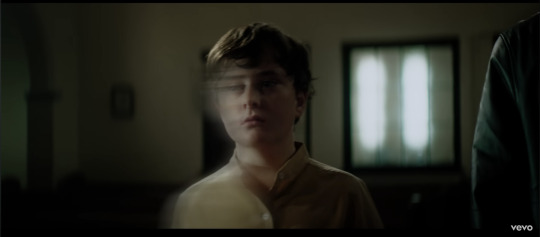
He looks up at David with something like disappointment. This could be a son disappointed in his father’s misdeeds (which I personally believe the lyrics to read as a sexual one, but it can be anything). More likely, however, it’s his younger self disappointed in the person he’s become; the lyrics don’t indicate that anyone other than the speaker, the person he’s wronged, and God know what he’s done.

The other members of the congregation have blurred faces as well.
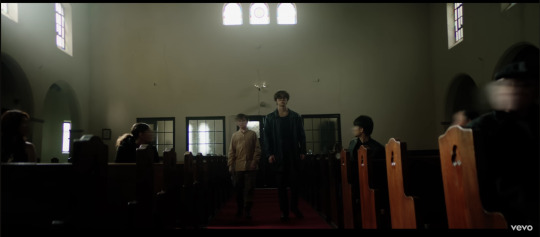
We don’t know who these people are, but the one we get a closeup of is an old man, who seems disapproving or judgmental. This might have been the point of the blurring--it doesn’t matter if these people are loved ones or strangers; there’s a terror that they might know your wrongdoings and see you differently.

David pulls out a dagger as the camera moves up from his torso. There seems to be a focus on his neck, evoking perhaps the idea of him causing his own violent death. Nothing like that happens, but considering the song’s themes of the self-destructive sin nature, it’s not that much of a stretch. It could also reference the idea of dying to self and becoming a living sacrifice, where his consideration of dying violently misses the point--Rick Warren says that as living sacrifices, we have the tendency to “crawl off the altar.”
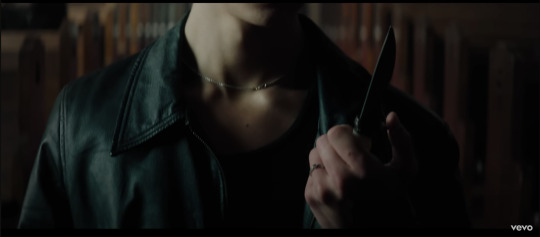
A large, dark shape appears during the prechorus before the line “There’s darkness in the distance” plays.
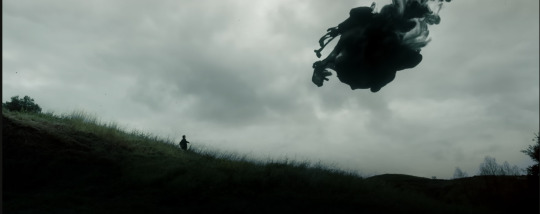
David’s expression is unclear; it looks ambivalent, worried, or even a bit frustrated.

He finally reaches out to this darkness.

The scene changes to the church again, which is darkened and empty. He’s in what appears to be specifically one of the back pews and adopts a stereotypical pose associated with prayer while crying out.

Back to the forest, where his axe is notably lodged in the tree stump. Perhaps his destruction is lodged within him in a similar manner, doing harm that he wishes to undo but knows he cannot? I could be reading too much into it, but whatever.

We’re at the church again, and now he sits at the altar with a more downcast, resigned expression. Perhaps the juxtaposition of pew/altar and stereotypical prayer/stereotypical resignation is saying he cries out for God when he feels farther from Him, but doesn’t know how to handle being closer because he then becomes more aware of how wrong his sin is. What’s also interesting is that there is light coming into the church in the wideshot of David at the altar, and it even seems to hit just outside where the altar is, but it doesn’t reach him and he’s not coming towards it either. God and His light are so close, but the speaker can neither come to terms with that nor confront his sin.
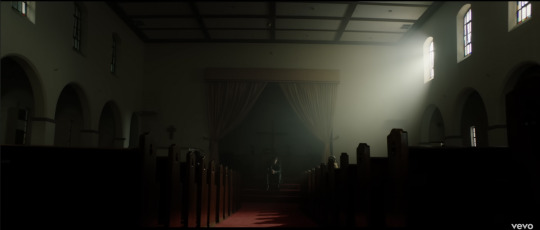
Again with the hands on chest thing, with a more intense movement this time. Perhaps if this is a reference to the Catholic Penitential Rite, then the reason his hands are open is because he doesn’t feel or doesn’t want to feel the weight of his sin at full force.

The second verse begins, and two men are seen dragging David into some secluded room--something like a torture chamber.

They become more visible and drop him. Interestingly, their postures at this screenshot suggest storming out during an altercation, even though in context, they’re supposed to be more cruel and cold and harsh due to separation and indifference. Perhaps it’s both--perhaps they’re meant to represent warring self-states that hate him personally sometimes and feel disconnected from him at other times. They can feel both ways at once, too; people can be complicated like that.

Back at the church, he’s in the back pew. There’s less of a crying out than in the chorus, but it’s still written on his expression. Some light goes past him and even onto him, but he is mostly in the shadows. He might be almost hoping for forgiveness and salvation but denying himself that hope out of fear that it isn’t true for him.
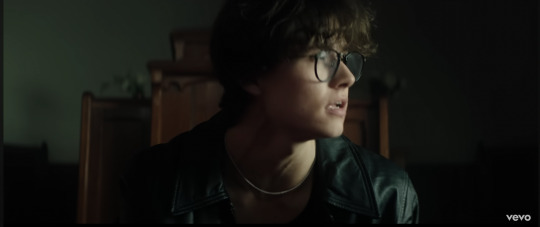
People with blurred faces start beating him up and throwing some spiky ball-like objects at him. As with the similarly blurred-out congregation, we don’t know who these people are or whether or not they’re close to him. Are they even real people or are they representations of other states of self? We just know that they’re causing him harm and distress. Perhaps the spiky ball-like objects are meant to be similar to morning star weapons, which look like that but are attached to the ends of chains and sticks. Wikipedia says he’s being stoned, which also makes sense.

The person who gets the most focus is noticeably wearing a cross necklace. This could be what David imagines to be God’s judgment, judgment by a religious hypocrite, or his own judgment.

There’s a shot of what seems to be David outside when it’s raining...

but it’s revealed that the rain is inside his own home. He’s drowning in shame and, as his poorly-postured position on the couch (a stereotypical way of showing indolence or indifference) suggests, his unwillingness to act on it exacerbates the problem. What’s interesting is that, like in the shots from church in the chorus, he has a lamp on and the light even reaches him. Here, God is there, waiting for him in his own home, but he does not accept.

We return to David, now with noticeably bleeding hands, in the torture chamber. It’s likely that he’s been fighting the others, as his knuckles are the injured part. However, it also seems to bring to mind the image of punching a wall (or in this case, more likely the floor) in frustration or to cause oneself pain. This might be a stretch, but to me, it also calls back to the opening with him chopping the wood as a displacement of anger. In that case, he thinks of his hands as instruments of only destruction and might be punishing himself for it. This isn’t as likely as the other interpretations because the torture chamber scene depicts him as the victim, but then again, he’s also a victim of his own behavior and the other people might be other self-states, so it’s still plausible.

The shot continues to show us that he has a cross tattooed on his hand, which was visible in the previous one but less clear. This can have plenty of different interpretations depending on which of the above contexts we’re going with. If he’s been fighting the others and they’re “[persecuting him] for righteousness’ sake” or for trying to become better, maybe having the cross with him strengthens him. It could also remind him of his failure to overcome them, though, which seems a bit more likely because this song does not have a triumphant arc. If he’s caused his own hand to get hurt, then having the cross there reminds him that his self-destruction is harming his relationship with God. If he thinks of his hands as only destructive, perhaps the cross reminds him that he has the potential to be better and use them for good--perhaps the cross is even being used as a force to destroy his sin. It might also be destructive to him in a different way if he thinks, as Martin Luther once put it, of Christ as “the jailer and hangman of [his] poor soul.” However it goes, there’s clearly some significance to showing it to the audience.

He gets up somewhat and the others prepare to fight him again.

In what appears to be a home library, a burning man reaches out to David. The part of focus is the burning man, who would realistically be in pain from the burning, but we don’t know what his expression is. His reaching seems pretty calm and restrained, though, almost beckoning. The burning man seems to represent the speaker’s sin itself, and his seeming lack of pain might indicate a seared conscience or a pretense of indifference (the speaker’s sin affects his soul greatly and fills him with fear; perhaps he pretends he doesn’t care when he’s about to do it). A point of interest aside from the burning man is the setting: why specifically a home library? To me, it evokes imagery of a learned man sitting in his study, someone like a theologian or philosopher. Maybe the speaker theoretically knows everything in these books, or at least a good amount of what’s in them, but yet, he cannot apply what he’s read to help himself.

David has a conflicted expression when considering whether he should take the burning man’s hand, similarly to how he approached the darkness in the first prechorus.

He sings the chorus while sitting on the church altar again in the same resigned position. There’s a bit more light than the first chorus had, and it extends across the altar now, but it’s not reaching him. God continues to extend mercy that the speaker won’t take.

He finally takes the burning man’s hand, and he is set on fire himself, symbolizing his choice to sin again. The library is also ablaze, which brings to mind imagery relating to hell. Going back to the symbolism of a library, he may have read the books and known what they said, but his inability to apply that has made him forget his knowledge--this is similar to C.S. Lewis saying “The more often he feels without acting, the less he will be able ever to act, and, in the long run, the less he will be able to feel.”

We go back to David in the torture chamber, and his forehead is bleeding now. This might be a reference to Jesus’ crown of thorns, in which case, David links their suffering in the battle against sin.

He is seen striking at his chest with a closed hand, which now confirms the reference to the Penitential Rite and uses the proper hand shape--considering his open hand before might have suggested an unwillingness or inability to feel his sin at full force, the closed hand now feels it completely.
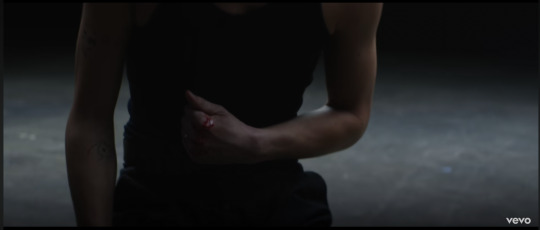
David’s mouth has also been injured in the shot where his forehead was hurt, but it’s not that visible without looking closely, so here’s a closer shot. I’m not entirely sure what it means that his mouth specifically was injured, but my guess is that Jesus is often described as the Word and the Holy Spirit as a breath or wind, with the Father being, of course, the one who speaks. Spoken word and breath are literally inseparable, but a mouth injury might impair David’s capacity to speak. Perhaps this might mean that David does not feel God is within him; he cannot understand the speaker if he has neither breath nor words to speak. As a tangent, it’s often a symptom of anxiety to feel short of breath, and our narrator is definitely anxious over the state of his soul. He might also feel out of breath from fighting.

One of the last shots has him in the back church pew with some light reaching him. Considering that this is the back pew and not the altar, this demonstrates his feelings of distance from God. David is no longer crying out as he was when we last saw him in the pew. While this could be read as a seared conscience, it’s not the best reading because the closed hand as opposed to an open one about two shots ago shows him understanding and feeling his sin at full force. It’s more likely that he’s not crying out because he’s expended his energy on this battle. Interestingly, the light is actually touching him now, which might suggest that he’s on the brink of readiness to accept grace. Sure, the final shot shows him in the torture chamber (I’ve already shown it to you, so I see no point in putting it here again), but he could be at the bottom and realizing that he only has one option if he wants to survive.
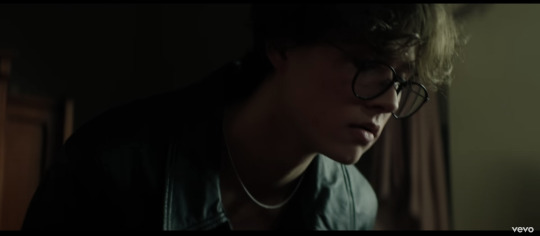
Well, that’s it, I hope someone reads and likes this because I should have been working on a Spanish project in the time it took me to make this but this hit my massive Enneagram 1 self too much to not do this LOL.
10 notes
·
View notes
Text
"How many vampires do you think have the stamina for immortality? They have the most dismal notions of immortality to begin with. For in becoming immortal they want all the forms of their life to be fixed as they are and incorruptible: carriages made in the same dependable fashion, clothing of the cut which suited their prime, men attired and speaking in the manner they have always understood and valued. When, in fact, all things change except the vampire himself; everything except the vampire is subject to constant corruption and distortion. Soon, with an inflexible mind, and often even with the most flexible mind, this immortality becomes a penitential sentence in a madhouse of figures and forms that are hopelessly unintelligible and without value. One evening a vampire rises and realizes what he has feared perhaps for decades, that he simply wants no more of life at any cost. That whatever style or fashion or shape of existence made immortality attractive to him has been swept off the face of the earth. And nothing remains to offer freedom from despair except the act of killing. And that vampire goes out to die. No one will find his remains. No one will know where he has gone. And often no one around him - should he still seek the company of other vampires - no one will know that he is in despair. He will have ceased long ago to speak of himself or of anything. He will vanish."
3 notes
·
View notes
Text
headcanon that Tommy went to Westminster and tried to beg Churchill not to involve him in that Russian Business and was bluntly rejected on account of him being the only one with the relevant contacts, and he had to go above and beyond Churchill (to the King!) to save his family at the end of it with no protection from Churchill at all
to then later have Churchill in S5 continue to use him down in that mud with no real hope for protection for his increasingly bad (trending fascist) name, but also give him advice on how not to commit suicide and keep soldiering on
to then have Tommy desperately state "I'll spend more hours working with Churchill" as his balancing act / good he will do after snapping and killing the Barwell/s as if Churchill is associated/affiliated with good as well as represents some kind of penitential rite
this relationship could be represented just as emotionally and morally twisted and crazy as Tommy and Mosley. The main difference is Churchill is pragmatic and not cruel, and has no rape threat/genocide threat associated for Tommy personally. But pragmatism and 'using the tool' (and Tommy sinking into a belief that he must be that tool with someone else's hand guiding him because he can't make his own decisions) could be an interesting destructive arc to explore
#things that were in my notes for my Charlie POV S6 Timeskip fic#Charlie Shelby secretly watching Churchill and his Dad talk after dinner and not understanding if Churchill is Enemy or Other
6 notes
·
View notes